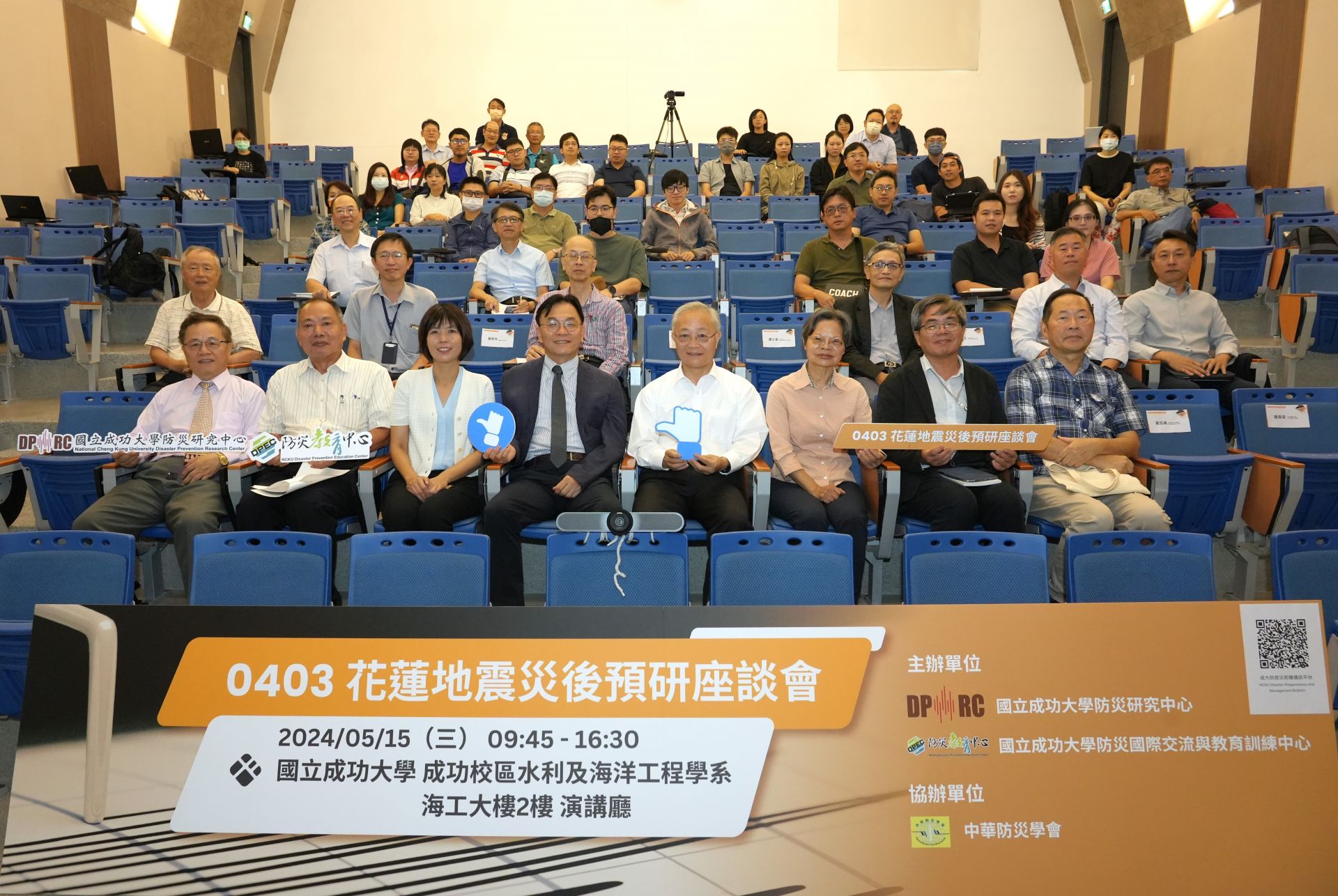SDG13
NCKU Hosts Symposium to Establish Interdisciplinary Platform for Earthquake Disaster Management.
In response to the potential subsequent disasters triggered by the Hualien earthquake on April 3rd of this year, the National Cheng Kung University (NCKU) Disaster Prevention Research Center and Disaster Prevention Education Center held the "0403 Hualien Earthquake Post-Disaster Research Symposium" on May 15th at the Hydraulics Building Lecture Hall on NCKU's Cheng-Kung Campus. Nearly 100 experts, scholars, and students attended, focusing on the possible natural disasters and response strategies following the Hualien earthquake. The symposium aimed to construct robust disaster prevention knowledge and raise awareness of natural disaster risks through interdisciplinary discussions based on scientific data and practical applications.
In his opening remarks, NCKU Vice President Woei-Jer Chuang emphasized that the lessons from the 0403 Hualien earthquake extend beyond the earthquake itself to include potential subsequent natural disasters. He mentioned his previous visit to Japan, where the country, in response to the Kobe earthquake, assessed future needs and discovered the absence of adequate medical facilities, leading to the establishment of a medical park. Vice President Chuang suggested that similar proactive measures could be considered for Hualien to enhance its resilience. He highlighted NCKU's rich resources, noting that the Disaster Prevention Research Center can lead collective efforts aligned with central policies to promote and disseminate disaster prevention knowledge, thereby increasing public awareness of post-earthquake hazards and mitigating their impacts.
Hsiao-Wen Wang, Director of the NCKU Disaster Prevention Research Center and the Disaster Prevention International Exchange and Education Training Center, first explained the rationale for holding this symposium. The first reason was that, despite international media praise for Taiwan's timely crisis response following the 0403 Hualien earthquake, from a disaster prevention and rescue research and practical perspective, it is crucial to review and compare the progress made since the 921 earthquake and identify areas for further improvement. The second reason is the current proliferation of online information. During urgent rescue operations, ensuring that both the general public and decision-makers "receive accurate information" can make rescue and reconstruction efforts more rapid and effective. Director Hsiao-Wen Wang also noted that in 2023, NCKU established the interdisciplinary "NCKU Disaster Preparedness and Management Bulletin" aiming to connect professional knowledge and practical experience across various fields during disasters. This platform integrates technology and research efforts to produce scientific data that supports government decision-making in disaster prevention and rescue and ensures that all sectors receive accurate information promptly, reducing panic.
The symposium covered topics such as "The Mechanism and Development Trends of Earthquakes," "The Impact and Countermeasures of Landslides," "The Impact and Countermeasures for Slope Safety," "The Impact and Countermeasures of the 0403 Earthquake on the Hualien-Taitung Area Tsunami," and a "Comprehensive Discussion" on related post-earthquake issues. Each session clarified Taiwan's environmental conditions from a scientific perspective, including the interpretation of earthquake observation information, the number and location of new landslides after the earthquake, the adjustment of alert values, strong ground motion observation network results, tsunami occurrence and warnings, building safety, urban renewal for disaster prevention, risk management, and governance. Speakers included Dean Chyan-Deng Jan, Professor Hsiao-Wen Wang, Professor Chjeng-Lun Shieh, Professor George C. Yao, and Professor Hsueh-Sheng Chang from NCKU’s College of Engineering, as well as Dean Wen-Yan Zhang, Distinguished Professor Jun-Yi Yen, and Honorary Professor Tzu-Erh Chen from National Dong Hwa University, Associate Professor Wei-An Chao from National Yang Ming Chiao Tung University, Professor Kuan-Yu Chen from National Sun Yat-sen University, Professor Tso-Jen Wu from National Central University, Disaster Reduction Monitoring Section Chief Yu-Hsiao Huang from the Ministry of Agriculture’s Soil and Water Conservation Bureau, and Disaster Prevention Section Chief Chiu-Ling Liu from the Tzu Chi Foundation.
Taiwan, located on the Pacific Ring of Fire, frequently experiences earthquakes, making them one of the most common natural disasters faced by residents. The organizers stated that key excerpts and outcomes from the "0403 Hualien Earthquake Post-Disaster Research Symposium" will be published in the "NCKU Disaster Preparedness and Management Bulletin" for reference by various sectors. Additionally, efforts to strengthen cooperation with all parties will continue, promoting the implementation of disaster prevention and response measures, thereby contributing to the safety and stability of Taiwan's environment.
In his opening remarks, NCKU Vice President Woei-Jer Chuang emphasized that the lessons from the 0403 Hualien earthquake extend beyond the earthquake itself to include potential subsequent natural disasters. He mentioned his previous visit to Japan, where the country, in response to the Kobe earthquake, assessed future needs and discovered the absence of adequate medical facilities, leading to the establishment of a medical park. Vice President Chuang suggested that similar proactive measures could be considered for Hualien to enhance its resilience. He highlighted NCKU's rich resources, noting that the Disaster Prevention Research Center can lead collective efforts aligned with central policies to promote and disseminate disaster prevention knowledge, thereby increasing public awareness of post-earthquake hazards and mitigating their impacts.
Hsiao-Wen Wang, Director of the NCKU Disaster Prevention Research Center and the Disaster Prevention International Exchange and Education Training Center, first explained the rationale for holding this symposium. The first reason was that, despite international media praise for Taiwan's timely crisis response following the 0403 Hualien earthquake, from a disaster prevention and rescue research and practical perspective, it is crucial to review and compare the progress made since the 921 earthquake and identify areas for further improvement. The second reason is the current proliferation of online information. During urgent rescue operations, ensuring that both the general public and decision-makers "receive accurate information" can make rescue and reconstruction efforts more rapid and effective. Director Hsiao-Wen Wang also noted that in 2023, NCKU established the interdisciplinary "NCKU Disaster Preparedness and Management Bulletin" aiming to connect professional knowledge and practical experience across various fields during disasters. This platform integrates technology and research efforts to produce scientific data that supports government decision-making in disaster prevention and rescue and ensures that all sectors receive accurate information promptly, reducing panic.
The symposium covered topics such as "The Mechanism and Development Trends of Earthquakes," "The Impact and Countermeasures of Landslides," "The Impact and Countermeasures for Slope Safety," "The Impact and Countermeasures of the 0403 Earthquake on the Hualien-Taitung Area Tsunami," and a "Comprehensive Discussion" on related post-earthquake issues. Each session clarified Taiwan's environmental conditions from a scientific perspective, including the interpretation of earthquake observation information, the number and location of new landslides after the earthquake, the adjustment of alert values, strong ground motion observation network results, tsunami occurrence and warnings, building safety, urban renewal for disaster prevention, risk management, and governance. Speakers included Dean Chyan-Deng Jan, Professor Hsiao-Wen Wang, Professor Chjeng-Lun Shieh, Professor George C. Yao, and Professor Hsueh-Sheng Chang from NCKU’s College of Engineering, as well as Dean Wen-Yan Zhang, Distinguished Professor Jun-Yi Yen, and Honorary Professor Tzu-Erh Chen from National Dong Hwa University, Associate Professor Wei-An Chao from National Yang Ming Chiao Tung University, Professor Kuan-Yu Chen from National Sun Yat-sen University, Professor Tso-Jen Wu from National Central University, Disaster Reduction Monitoring Section Chief Yu-Hsiao Huang from the Ministry of Agriculture’s Soil and Water Conservation Bureau, and Disaster Prevention Section Chief Chiu-Ling Liu from the Tzu Chi Foundation.
Taiwan, located on the Pacific Ring of Fire, frequently experiences earthquakes, making them one of the most common natural disasters faced by residents. The organizers stated that key excerpts and outcomes from the "0403 Hualien Earthquake Post-Disaster Research Symposium" will be published in the "NCKU Disaster Preparedness and Management Bulletin" for reference by various sectors. Additionally, efforts to strengthen cooperation with all parties will continue, promoting the implementation of disaster prevention and response measures, thereby contributing to the safety and stability of Taiwan's environment.
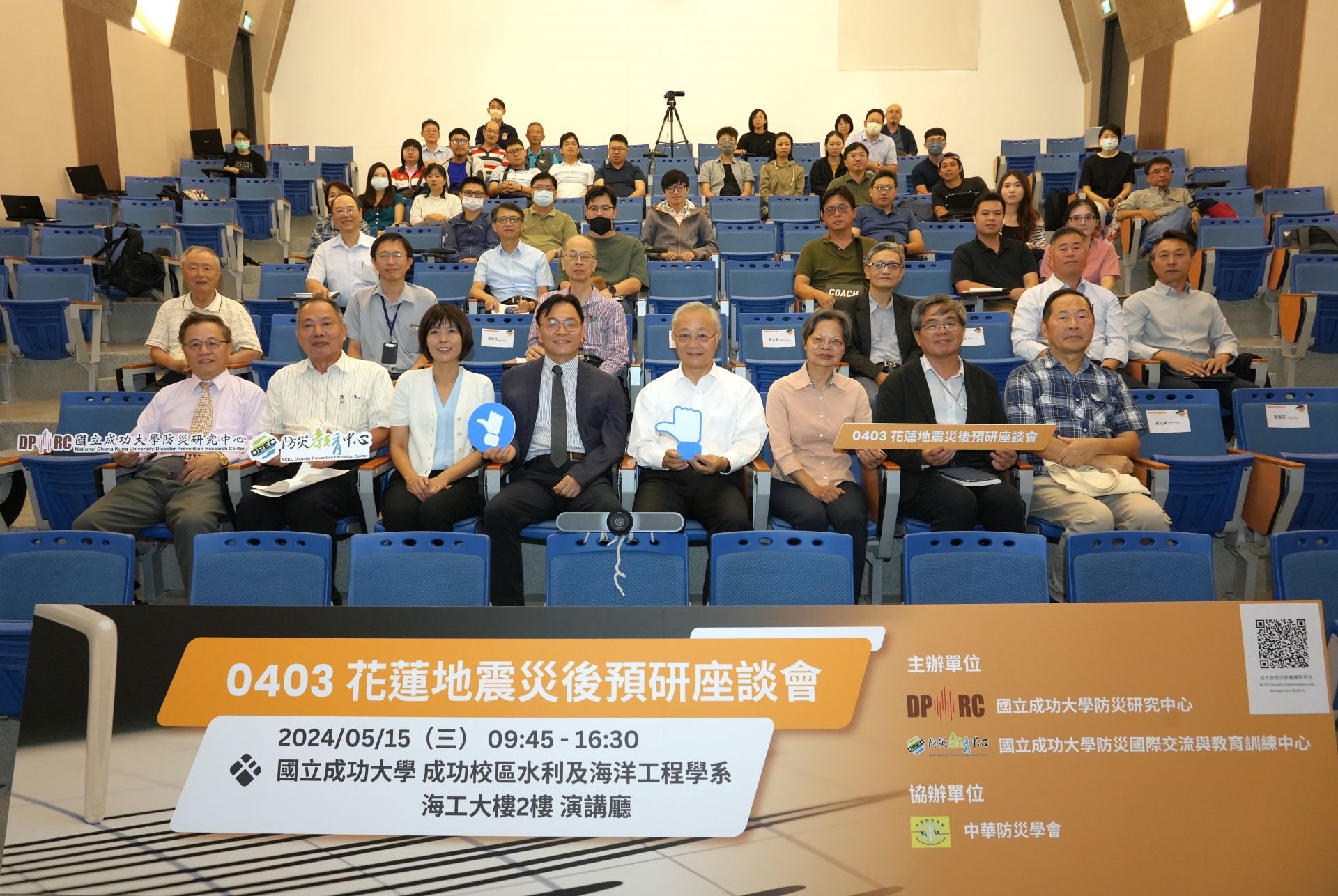
Experts, scholars, and students participated in the "0403 Hualien Earthquake Post-Disaster Research Symposium," collectively focusing on potential natural disasters and response strategies following the Hualien earthquake.
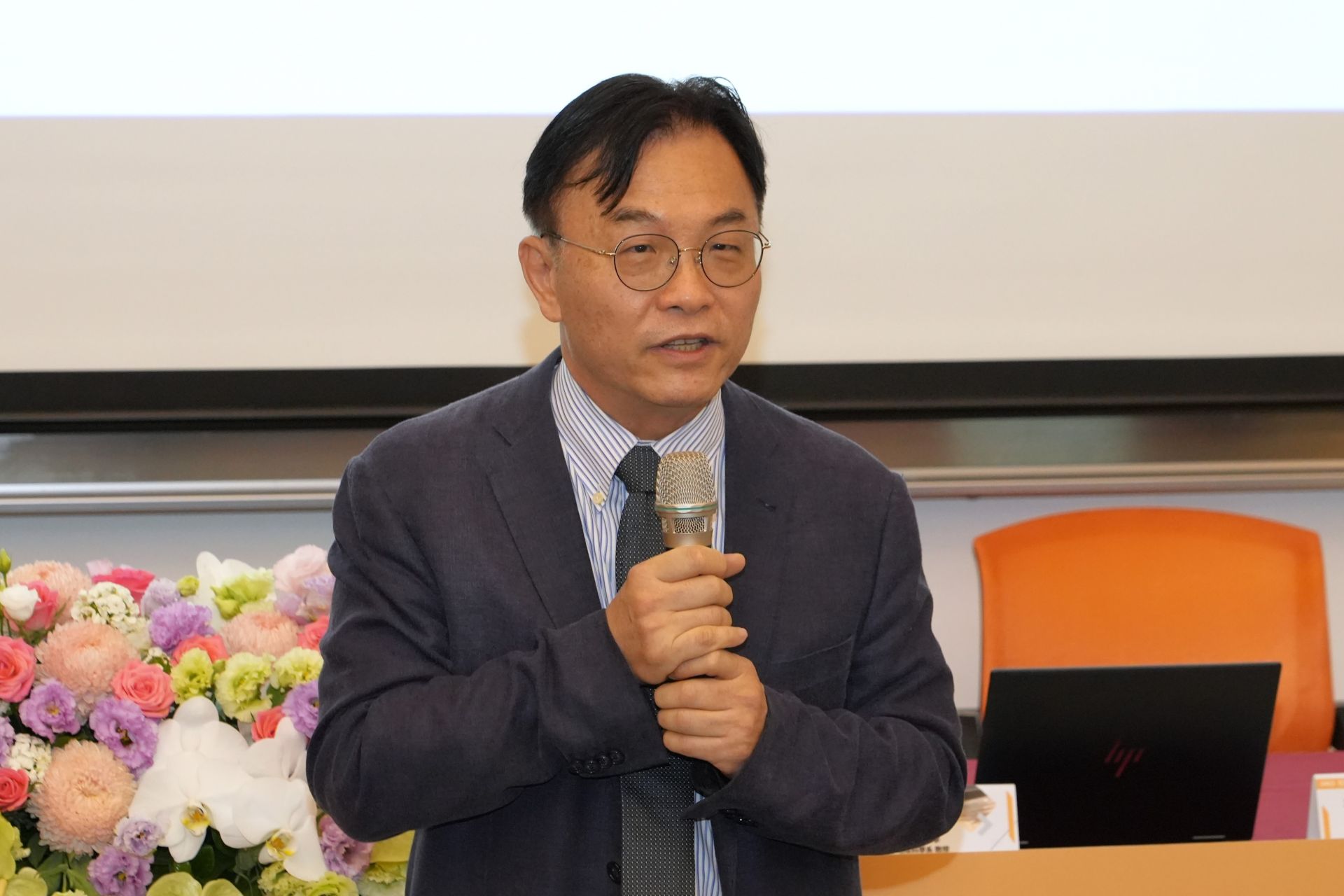
NCKU Vice President Woei-Jer Chuang Shares Observations from a Visit to Japan During His Address.
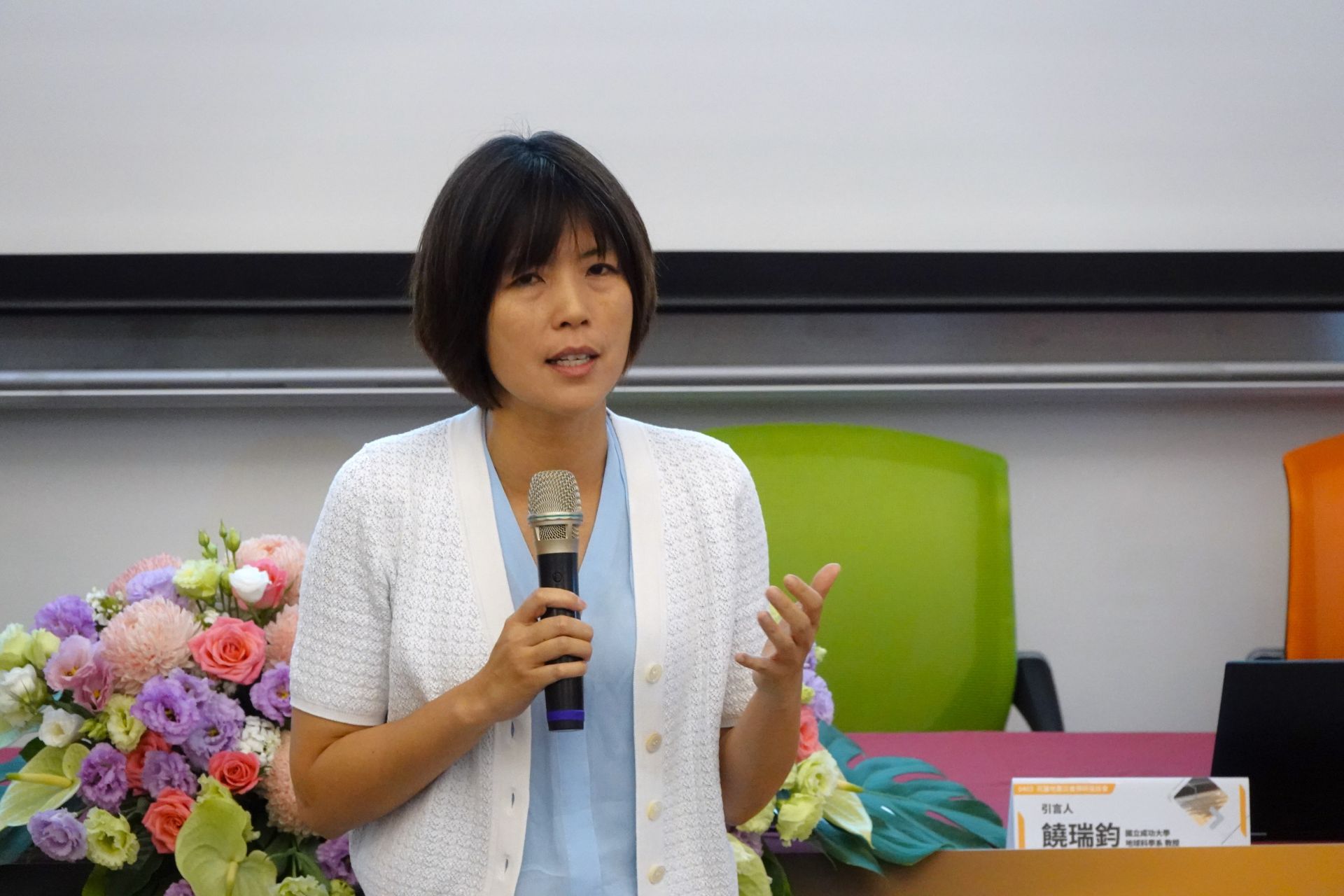
Director Hsiao-Wen Wang Explains the Rationale for and Future Expectations of the Symposium.
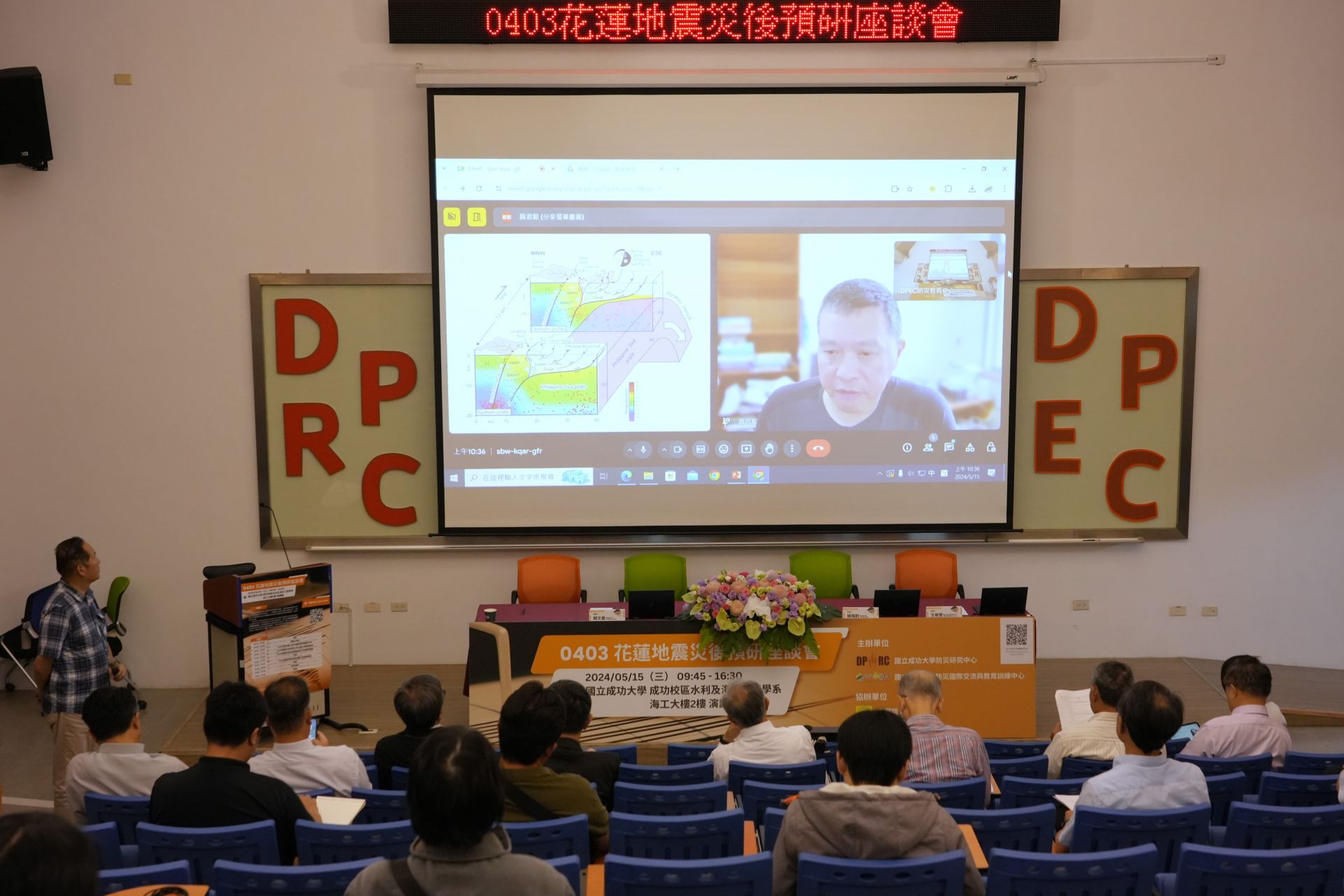
Multiple Experts and Scholars Gather at the "0403 Hualien Earthquake Post-Disaster Research Symposium" to Explore Optimal Solutions for Accurate Disaster Risk Management.
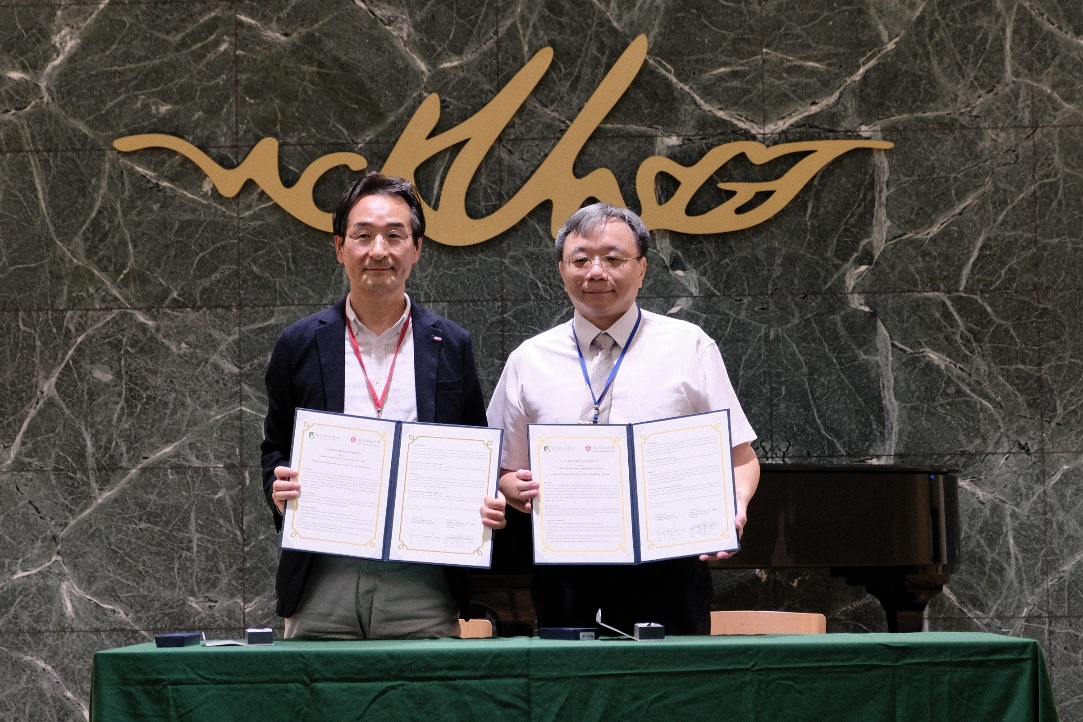
SDG13NCKU and Sungkyunkwan University signed a MOU to advance a sustainable future with net-zero buildings.
View more
SDG13NCKU partners with Taiwan Stock Exchange and Carbon Exchange for a forum on transitioning to net zero
View more

